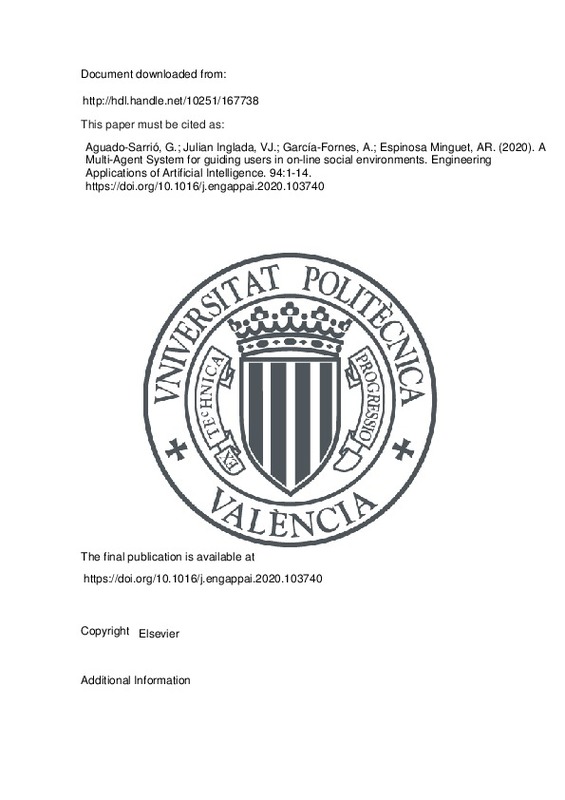Aguado, G., Julian, V., & Garcia-Fornes, A. (2018). Towards Aiding Decision-Making in Social Networks by Using Sentiment and Stress Combined Analysis. Information, 9(5), 107. doi:10.3390/info9050107
Alrubaian, M., Al-Qurishi, M., Alamri, A., Al-Rakhami, M., Hassan, M. M., & Fortino, G. (2019). Credibility in Online Social Networks: A Survey. IEEE Access, 7, 2828-2855. doi:10.1109/access.2018.2886314
Buccafurri, F., Comi, A., Lax, G., & Rosaci, D. (2016). Experimenting with Certified Reputation in a Competitive Multi-Agent Scenario. IEEE Intelligent Systems, 31(1), 48-55. doi:10.1109/mis.2015.98
[+]
Aguado, G., Julian, V., & Garcia-Fornes, A. (2018). Towards Aiding Decision-Making in Social Networks by Using Sentiment and Stress Combined Analysis. Information, 9(5), 107. doi:10.3390/info9050107
Alrubaian, M., Al-Qurishi, M., Alamri, A., Al-Rakhami, M., Hassan, M. M., & Fortino, G. (2019). Credibility in Online Social Networks: A Survey. IEEE Access, 7, 2828-2855. doi:10.1109/access.2018.2886314
Buccafurri, F., Comi, A., Lax, G., & Rosaci, D. (2016). Experimenting with Certified Reputation in a Competitive Multi-Agent Scenario. IEEE Intelligent Systems, 31(1), 48-55. doi:10.1109/mis.2015.98
Cao, Q., & Schniederjans, M. J. (2006). Agent-mediated architecture for reputation-based electronic tourism systems: A neural network approach. Information & Management, 43(5), 598-606. doi:10.1016/j.im.2006.03.001
Christofides, E., Muise, A., & Desmarais, S. (2012). Risky Disclosures on Facebook. Journal of Adolescent Research, 27(6), 714-731. doi:10.1177/0743558411432635
Feldman, R. (2013). Techniques and applications for sentiment analysis. Communications of the ACM, 56(4), 82-89. doi:10.1145/2436256.2436274
Fortino, G., Messina, F., Rosaci, D., & Sarné, G. M. L. (2018). Using trust and local reputation for group formation in the Cloud of Things. Future Generation Computer Systems, 89, 804-815. doi:10.1016/j.future.2018.07.021
George, J. M., & Dane, E. (2016). Affect, emotion, and decision making. Organizational Behavior and Human Decision Processes, 136, 47-55. doi:10.1016/j.obhdp.2016.06.004
Hu, M., Liu, B., Mining opinion features in customer reviews. In: AAAI, Vol. 4. pp. 755–760.
López-Ortega, O., & Villar-Medina, I. (2009). A multi-agent system to construct production orders by employing an expert system and a neural network. Expert Systems with Applications, 36(2), 2937-2946. doi:10.1016/j.eswa.2008.01.070
Mehrabian, A. (1996). Pleasure-arousal-dominance: A general framework for describing and measuring individual differences in Temperament. Current Psychology, 14(4), 261-292. doi:10.1007/bf02686918
O’Brien, P. D., & Nicol, R. C. (1998). BT Technology Journal, 16(3), 51-59. doi:10.1023/a:1009621729979
Rincon, J. A., de la Prieta, F., Zanardini, D., Julian, V., & Carrascosa, C. (2017). Influencing over people with a social emotional model. Neurocomputing, 231, 47-54. doi:10.1016/j.neucom.2016.03.107
Rosaci, D. (2007). CILIOS: Connectionist inductive learning and inter-ontology similarities for recommending information agents. Information Systems, 32(6), 793-825. doi:10.1016/j.is.2006.06.003
Rosaci, D., & Sarnè, G. M. L. (2014). Multi-agent technology and ontologies to support personalization in B2C E-Commerce. Electronic Commerce Research and Applications, 13(1), 13-23. doi:10.1016/j.elerap.2013.07.003
Savaglio, C., Ganzha, M., Paprzycki, M., Bădică, C., Ivanović, M., & Fortino, G. (2020). Agent-based Internet of Things: State-of-the-art and research challenges. Future Generation Computer Systems, 102, 1038-1053. doi:10.1016/j.future.2019.09.016
Schouten, K., & Frasincar, F. (2016). Survey on Aspect-Level Sentiment Analysis. IEEE Transactions on Knowledge and Data Engineering, 28(3), 813-830. doi:10.1109/tkde.2015.2485209
Thelwall, M. (2017). TensiStrength: Stress and relaxation magnitude detection for social media texts. Information Processing & Management, 53(1), 106-121. doi:10.1016/j.ipm.2016.06.009
Thelwall, M., Buckley, K., Paltoglou, G., Cai, D., & Kappas, A. (2010). Sentiment strength detection in short informal text. Journal of the American Society for Information Science and Technology, 61(12), 2544-2558. doi:10.1002/asi.21416
Vanderhoven, E., Schellens, T., Vanderlinde, R., & Valcke, M. (2015). Developing educational materials about risks on social network sites: a design based research approach. Educational Technology Research and Development, 64(3), 459-480. doi:10.1007/s11423-015-9415-4
Xie, W., & Kang, C. (2015). See you, see me: Teenagers’ self-disclosure and regret of posting on social network site. Computers in Human Behavior, 52, 398-407. doi:10.1016/j.chb.2015.05.059
[-]







![[Cerrado]](/themes/UPV/images/candado.png)


